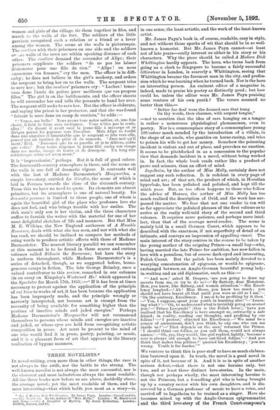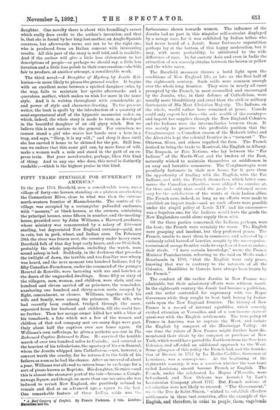THREE NOVELISTS.*
Ix novel-writing, even more than in other things, the race is not always to the swift, nor the battle to the strong. The well-known novelist is not always the most successful, nor is the cleverest and most industrious always the most readable. All the three books now before us are above, decidedly above, the average novel ; yet the most readable of them, and the most interesting—that which holds you most as a story—is, • (1.) A Mo tern Dick Whittington. By James Payn. London : Cassell and Co. —(2.) Ingelivim. By the Author of " Miss Molly." London : W. Blackwood and Sons,—(2.) A Daughter of Mystery. By Jessie XrikOrian. London: FArrtu, and Op,
in one sense, the least artistic, and the work of the least-known artist.
Mr. James Payn's book is, of course, readable, easy in style, and not without those sparks of wit that should be in so well- known a humorist. Bat Mr. James Payn cannot—at least not of late years—really interest us either in his story or his characters. Why the piece should be called A Modern Dick Whittington hardly appears. The hero, who turns back from going as a clerk to Singapore to become a fairly successful
litterateur in London, is scarcely a Whittington, seeing that Whittington became the foremost man in the city, and profes- sion which he was learning when he turned back. Nor is the hero an interesting person. An eminent editor of a magazine is, indeed, made to praise his poetry as distinctly good ; but how could he, unless the editor were Mr. James Payn praising some venture of his own youth ? The verses scanned no better than this,— "Better far deaf were the doomed ears that hung On thy words, thou charmer, with serpent tongue," —not to mention that the idea of ears hanging on a tongue is rather a monstrous physiological phenomenon, even in
poetry. Nor is a commonplace story of a commonplace young litterateur much mended by the introduction of a villain, in the shape of an uncle, who gambles on horse-racing, and tries to poison his wife to get her money. Somehow the poisoning incident is violent and out of place, and provokes no emotion.
It seems to be pitchforked in as a concession to the popular view that demands incident in a novel, without being worked in. In fact, the whole book reads rather like a product of paste and scissors, than an effort of mind.
Ingelheim, by the author of Miss Molly, certainly does not suggest any such reflection. It is redolent in every page of mind and art ; of that art, the product of which, in Horatian hyperbole, has been polished and polished, and kept till the ninth year. But, as too often happens to those who follow the advice of Horace, the author of Miss Molly has too much realised the description of Ovid, and the work has sur- passed the matter. We fear that not one reader in ten will so far appreciate the polished phrases of the first volume as to arrive at the really well-told story of the second and third volumes. It requires more patience, and perhaps more intel- lect, than that of the average novel-reader. The scene is mainly laid in a small German Court, which appears to be
described with the exactness, if not superfluity of detail of an intimate, and conveys an impression of appalling ennui. The main interest of the story centres in the course to be taken by
the young mother of the reigning Prince—a small boy—who, having married the late Prince for ambition, has now fallen in love with a penniless, but of course dark-eyed and interesting, Polish Count. But the polish has been mainly devoted to a wearying concatenation of epigrams, or would-be epigrams, exchanged between an Anglo-German beautiful young lads - in-waiting and an old diplomatist, such as this :—
" And now,' asked M. Desprez, • are you going to draw my secrets from me, or try to do so?—' By flattery, dear Monsieur. Men, you know, like flattery, and women attention.'— His Excel- lency laughed.= Ah ! Miss Shore, you know too much ; you should not have learnt all that until you were as old as I am. — ' On the contrary, Excellency. I me In to be profiting by it then.'
You, I suppose, spent your youth in learning also !'—' Learn- ing what?'—' Oh, to understand what is invisibly going on around you.'—' Prince Lescynski ' [this is the Polish lover], have you realised that his Excellency is here amongst us, outwardly a safe friend; in reality, reading our thoughts, and profiting by our follies ?'—`I protest,' objected his Excellency.' We must be a source of amusement, don't you think, to any one who can see inside us ? That depends on the seer,' returned the Prince. I should think our follies, as you call them, would not always amuse.'—' Oh, yes, they would; the girl replied, lightly, 'because a seer is always old enough to have out-lived follies.'—' And you think that makes him pitiless ?' queried his Excellency ; you are wrong. Youth is far harder.' " We venture to think this is poor stuff to have so much elabora- tion bestowed upon it. In truth, the novel is a good novel in spite of it, not because of it. And it is so in spite of another serious defect,—that there is not one heroine only, but two, and at least three distinct love-stories. In the main, though not perhaps wholly, the most interesting heroine is not the Princess, but a foundling girl who is being brought up by a country rector with his own daughters, and is dis- covered by a German professor of music to have a voice, and carried off to Ingelheim to be trained as a singer. Here she becomes mixed up with the Anglo-German epigrammatist
and the third lave-story of the French Gourt-composer'l
daughter. One novelty there is about this foundling's career which really does credit to the author's invention, and that is, that she is found by her long-lost mother, an Anglo-Spanish countess, but afterwards turns out not to be the right one, who is produced from an Italian convent with interesting results. All this part of the story is well told, and is readable. And if the author will give a little less elaboration to her descriptions of people—or perhaps we should say, a little less iteration and a little less polish to their conversation—she bids fair to produce, at another attempt, a considerable work.
The third novel—A Daughter of Mystery, by Jessie Kri- korian—is more likely to please the general reader. It begins with an excellent scene between a spirited daughter (who, by the way, fails to maintain her spirits afterwards) and a querulous mother, which makes us wish for more in the same style. And it is written throughout with considerable go and power of style and character-drawing. To the present writer, the book is spoilt by the introduction of a quantity of semi-supernatural stuff of the hypnotic mesmerist order, on which, indeed, the whole story is made to turn, as developed in the beautiful daughter of an old gipsy witch. But we believe this is not caviare to the general. For ourselves, we cannot stand a girl who waves her bands over a hare in a trap, and says, " Sleep, it is my will ;" and sleep it does until she has carried it home to be skinned for the pot. Still less, can we endure that this same girl can, by mere force of will, make a woman walk a mile and stand in the path of an ex- press train. But your novel-reader, perhaps, likes this kind of thing. And to any one who does, this novel is distinctly readable ;—which is the highest praise in this kind.























































 Previous page
Previous page